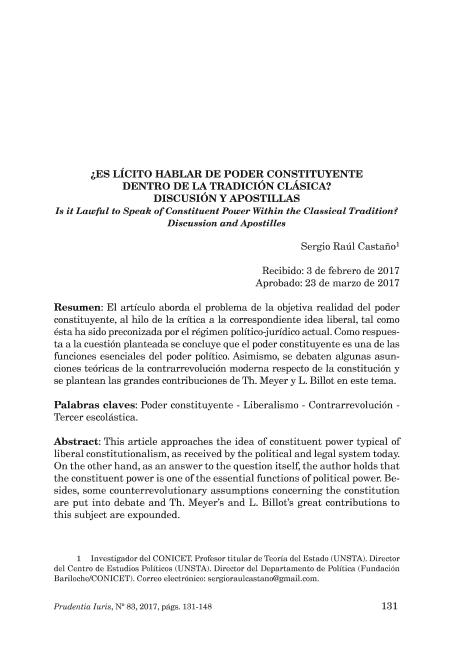Artículo
This article approaches critically the idea of constituent power typical of liberal constitutionalism, as received by the political and legal system currently in force today. On the other hand, as a systematic answer to the question itself, the autor holds that there is a true, not ideological notion of constituent power, i. e., as one of the essential functions of political power. Besides, in orden to clarify the discussion about this controversial issue, some counterrevolutionary assumptions concerning the constitution are put into debate and Th. Meyer’s and L. Billot’s great contributions to this subject are expounded. El artículo aborda el problema de la objetiva realidad del poder constituyente, al hilo de la crítica a la correspondiente idea liberal, tal comoésta ha sido preconizada por el régimen político-jurídico actual. Como respuestaa la cuestión planteada se concluye que el poder constituyente es una de las funciones esenciales del poder político.Asimismo, se debaten algunas asunciones teóricas de la contrarrevolución moderna respecto de la constitución y se plantean las grandes contribuciones de Th. Meyer y L. Billot en este tema.
¿Es lícito hablar de poder constituyente dentro de la tradición clásica? Discusión y apostillas
Título:
Is it Lawful to Speak of Constituent Power Within the Classical Tradition? Discussion and Apostilles
Fecha de publicación:
10/2017
Editorial:
Pontificia Universidad Católica Argentina "Santa María de los Buenos Aires". Facultad de Derecho
Revista:
Prudentia Juris
ISSN:
0326-2774
Idioma:
Español
Tipo de recurso:
Artículo publicado
Clasificación temática:
Resumen
Palabras clave:
Poder Constituyente
,
Constitución
,
Liberalismo
,
Tercera Escolástica
Archivos asociados
Licencia
Identificadores
Colecciones
Articulos(CCT - NOA SUR)
Articulos de CTRO.CIENTIFICO TECNOL.CONICET - NOA SUR
Articulos de CTRO.CIENTIFICO TECNOL.CONICET - NOA SUR
Citación
Castaño, Sergio Raul; ¿Es lícito hablar de poder constituyente dentro de la tradición clásica? Discusión y apostillas; Pontificia Universidad Católica Argentina "Santa María de los Buenos Aires". Facultad de Derecho; Prudentia Juris; 83; 10-2017; 131-148
Compartir




